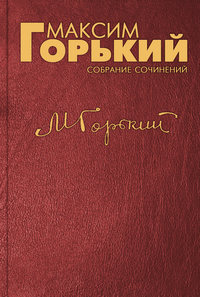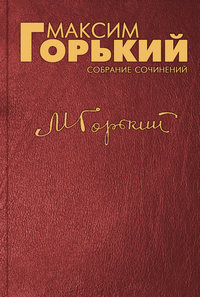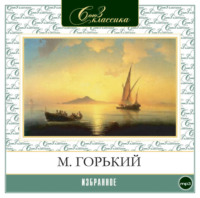 полная версия
полная версияThe Man Who Was Afraid
“My son,” whispered Ignat in a dull voice, “My darling! My joy! Learn while I am alive. Alas! it is hard to live.”
The child’s heart trembled at this whisper; he set his teeth together, and hot tears gushed from his eyes.
Until this day Ignat had never kindled any particular feeling in his son: the boy was used to him; he was tired of looking at his enormous figure, and feared him slightly, but was at the same time aware that his father would do anything for him that he wanted. Sometimes Ignat would stay away from home a day, two, a week, or possibly the entire summer. And yet Foma did not even notice his absence, so absorbed was he by his love for Aunt Anfisa. When Ignat returned the boy was glad, but he could hardly tell whether it was his father’s arrival that gladdened him or the playthings he brought with him. But now, at the sight of Ignat, the boy ran to meet him, grasped him by the hand, laughed, stared into his eyes and felt weary if he did not see him for two or three hours: His father became interesting to him, and, rousing his curiosity, he fairly developed love and respect for himself. Every time that they were together Foma begged his father:
“Papa, tell me about yourself.”
............
The steamer was now going up the Volga. One suffocating night in July, when the sky was overcast with thick black clouds, and everything on the Volga was somewhat ominously calm, they reached Kazan and anchored near Uslon at the end of an enormous fleet of vessels. The clinking of the anchor chains and the shouting of the crew awakened Foma; he looked out of the window and saw, far in the distance, small lights glimmering fantastically: the water about the boat black and thick, like oil – and nothing else could be seen. The boy’s heart trembled painfully and he began to listen attentively. A scarcely audible, melancholy song reached his ears – mournful and monotonous as a chant on the caravan the watchmen called to one another; the steamer hissed angrily getting up steam. And the black water of the river splashed sadly and quietly against the sides of the vessels. Staring fixedly into the darkness, until his eyes hurt, the boy discerned black piles and small lights dimly burning high above them. He knew that those were barges, but this knowledge did not calm him and his heart throbbed unevenly, and, in his imagination, terrifying dark images arose.
“O-o-o,” a drawling cry came from the distance and ended like a wail.
Someone crossed the deck and went up to the side of the steamer.
“O-o-o,” was heard again, but nearer this time.
“Yefim!” some one called in a low voice on the deck. “Yefimka!”
“Well?”
“Devil! Get up! Take the boat-hook.”
“O-o-o,” someone moaned near by, and Foma, shuddering, stepped back from the window.
The queer sound came nearer and nearer and grew in strength, sobbed and died out in the darkness. While on the deck they whispered with alarm:
“Yefimka! Get up! A guest is floating!”
“Where?” came a hasty question, then bare feet began to patter about the deck, a bustle was heard, and two boat-hooks slipped down past the boy’s face and almost noiselessly plunged into the water.
“A gue-e-est!” Some began to sob near by, and a quiet, but very queer splash resounded.
The boy trembled with fright at this mournful cry, but he could not tear his hands from the window nor his eyes from the water.
“Light the lantern. You can’t see anything.”
“Directly.”
And then a spot of dim light fell over the water. Foma saw that the water was rocking calmly, that a ripple was passing over it, as though the water were afflicted, and trembled for pain.
“Look! Look!” they whispered on the deck with fright.
At the same time a big, terrible human face, with white teeth set together, appeared on the spot of light. It floated and rocked in the water, its teeth seemed to stare at Foma as though saying, with a smile:
“Eh, boy, boy, it is cold. Goodbye!”
The boat-hooks shook, were lifted in the air, were lowered again into the water and carefully began to push something there.
“Shove him! Shove! Look out, he may be thrown under the wheel.”
“Shove him yourself then.”
The boat-hooks glided over the side of the steamer, and, scratching against it, produced a noise like the grinding of teeth. Foma could not close his eyes for watching them. The noise of feet stamping on the deck, over his head, was gradually moving toward the stern. And then again that moaning cry for the dead was heard:
“A gue-e-est!”
“Papa!” cried Foma in a ringing voice. “Papa!” His father jumped to his feet and rushed toward him.
“What is that? What are they doing there?” cried Foma.
Wildly roaring, Ignat jumped out of the cabin with huge bounds. He soon returned, sooner than Foma, staggering and looking around him, had time to reach his father’s bed.
“They frightened you? It’s nothing!” said Ignat, taking him up in his arms. “Lie down with me.”
“What is it?” asked Foma, quietly.
“It was nothing, my son. Only a drowned man. A man was drowned and he is floating. That’s nothing! Don’t be afraid, he has already floated clear of us.”
“Why did they push him?” interrogated the boy, firmly pressing close to his father, and shutting his eyes for fright.
“It was necessary to do so. The water might have thrown him under the wheel. Under ours, for instance. Tomorrow the police would notice it, there would be trouble, inquests, and we would be held here for examination. That’s why we shoved him along. What difference does it make to him? He is dead; it doesn’t pain him; it doesn’t offend him. And the living would be troubled on his account. Sleep, my son.
“So he will float on that way?”
“He will float. They’ll take him out somewhere and bury him.”
“And will a fish devour him?”
“Fish do not eat human bodies. Crabs eat them. They like them.”
Foma’s fright was melting, from the heat of his father’s body, but before his eyes the terrible sneering face was still rocking in the black water.
“And who is he?”
“God knows! Say to God about him: ‘Oh Lord, rest his soul! ‘”
“Lord, rest his soul!” repeated Foma, in a whisper.
“That’s right. Sleep now, don’t fear. He is far away now! Floating on. See here, be careful as you go up to the side of the ship. You may fall overboard. God forbid! And – ”
“Did he fall overboard?”
“Of course. Perhaps he was drunk, and that’s his end! And maybe he threw himself into the water. There are people who do that. They go and throw themselves into the water and are drowned. Life, my dear, is so arranged that death is sometimes a holiday for one, sometimes it is a blessing for all.”
“Papa.”
“Sleep, sleep, dear.”
CHAPTER III
DURING the very first day of his school life, stupefied by the lively and hearty noise of provoking mischiefs and of wild, childish games, Foma picked out two boys from the crowd who at once seemed more interesting to him than the others. One had a seat in front of him. Foma, looking askance, saw a broad back; a full neck, covered with freckles; big ears; and the back of the head closely cropped, covered with light-red hair which stood out like bristles.
When the teacher, a bald-headed man, whose lower lip hung down, called out: “Smolin, African!” the red-headed boy arose slowly, walked up to the teacher, calmly stared into his face, and, having listened to the problem, carefully began to make big round figures on the blackboard with chalk.
“Good enough!” said the teacher. “Yozhov, Nicolai. Proceed!”
One of Foma’s neighbours, a fidgety little boy with black little mouse-eyes, jumped up from his seat and passed through the aisle, striking against everything and turning his head on all sides. At the blackboard he seized the chalk, and, standing up on the toes of his boots, noisily began to mark the board with the chalk, creaking and filling with chalk dust, dashing off small, illegible marks.
“Not so loud!” said the teacher, wrinkling his yellow face and contracting his fatigued eyes. Yozhov spoke quickly and in a ringing voice:
“Now we know that the first peddler made 17k. profit.”
“Enough! Gordyeeff! Tell me what must we do in order to find out how much the second peddler gained?”
Watching the conduct of the boys, so unlike each other, Foma was thus taken unawares by the question and he kept quiet.
“Don’t you know? How? Explain it to him, Smolin.”
Having carefully wiped his fingers, which had been soiled with chalk, Smolin put the rag away, and, without looking at Foma, finished the problem and again began to wipe his hands, while Yozhov, smiling and skipping along as he walked, returned to his seat.
“Eh, you!” he whispered, seating himself beside Foma, incidentally striking his side with his fist. “Why don’t you know it? What was the profit altogether? Thirty kopecks. And there were two peddlers. One of them got 17. Well, how much did the other one get?”
“I know,” replied Foma, in a whisper, feeling confused and examining the face of Smolin, who was sedately returning to his seat. He didn’t like that round, freckled face, with the blue eyes, which were loaded with fat. And Yozhov pinched his leg and asked:
“Whose son are you? The Frantic’s?”
“Yes.”
“So. Do you wish me to prompt you always?”
“Yes.”
“And what will you give me for it?”
Foma thought awhile and asked:
“And do you know it all yourself?”
“I? I am the best pupil. You’ll see for yourself.”
“Hey, there! Yozhov, you are talking again?” cried the teacher, faintly.
Yozhov jumped to his feet and said boldly:
“It’s not I, Ivan Andreyich – it’s Gordyeeff.”
“Both of them were whispering,” announced Smolin, serenely.
Wrinkling his face mournfully and moving his big lip comically, the teacher reprimanded them all, but his words did not prevent Yozhov from whispering immediately:
“Very well, Smolin! I’ll remember you for telling.”
“Well, why do you blame it all on the new boy?” asked Smolin, in a low voice, without even turning his head to them.
“All right, all right,” hissed Yozhov.
Foma was silent, looking askance at his brisk neighbour, who at once pleased him and roused in him a desire to get as far as possible away from him. During recess he learned from Yozhov that Smolin, too, was rich, being the son of a tan-yard proprietor, and that Yozhov himself was the son of a guard at the Court of Exchequer, and very poor. The last was clearly evident by the adroit boy’s costume, made of gray fustian and adorned with patches on the knees and elbows; by his pale, hungry-looking face; and, by his small, angular and bony figure. This boy spoke in a metallic alto, elucidating his words with grimaces and gesticulations, and he often used words whose meaning was known but to himself.
“We’ll be friends,” he announced to Foma.
“Why did you complain to the teacher about me?” Gordyeeff reminded Yozhov, looking at him suspiciously.
“There! What’s the difference to you? You are a new scholar and rich. The teacher is not exacting with the rich. And I am a poor hanger-on; he doesn’t like me, because I am impudent and because I never bring him any presents. If I had been a bad pupil he would have expelled me long ago. You know I’ll go to the Gymnasium from here. I’ll pass the second class and then I’ll leave. Already a student is preparing me for the second class. There I’ll study so that they can’t hold me back! How many horses do you have?”
“Three. What do you need to study so much for?” asked Foma.
“Because I am poor. The poor must study hard so that they may become rich. They become doctors, functionaries, officers. I shall be a ‘tinkler.’ A sword at my side, spur on my boots. Cling, cling! And what are you going to be?”
“I don’t know,” said Foma, pensively, examining his companion.
“You need not be anything. And are you fond of pigeons?”
“Yes.”
“What a good-for-nothing you are! Oh! Eh!” Yozhov imitated Foma’s slow way of speaking. “How many pigeons do you have?”
“I have none.”
“Eh, you! Rich, and yet you have no pigeons. Even I have three. If my father had been rich I would have had a hundred pigeons and chased them all day long. Smolin has pigeons, too, fine ones! Fourteen. He made me a present of one. Only, he is greedy. All the rich are greedy. And you, are you greedy, too?”
“I don’t know,” said Foma, irresolutely.
“Come up to Smolin’s and the three of us together will chase the pigeons.”
“Very well. If they let me.”
“Why, does not your father like you?”
“He does like me.”
“Well, then, he’ll let you go. Only don’t tell him that I am coming. Perhaps he would not let you go with me. Tell him you want to go to Smolin’s. Smolin!”
A plump boy came up to them, and Yozhov accosted him, shaking his head reproachfully:
“Eh, you red-headed slanderer! It isn’t worth while to be friends with you, blockhead!”
“Why do you abuse me?” asked Smolin, calmly, examining Foma fixedly.
“I am not abusing you; I am telling the truth,” Yozhov explained, straightening himself with animation. “Listen! Although you are a kissel, but – let it go! We’ll come up to see you on Sunday after mass.”
“Come,” Smolin nodded his head.
“We’ll come up. They’ll ring the bell soon. I must run to sell the siskin,” declared Yozhov, pulling out of his pocket a paper package, wherein some live thing was struggling. And he disappeared from the school-yard as mercury from the palm of a hand.
“What a queer fellow he is!” said Foma, dumfounded by Yozhov’s adroitness and looking at Smolin interrogatively.
“He is always like this. He’s very clever,” the red-headed boy explained.
“And cheerful, too,” added Foma.
“Cheerful, too,” Smolin assented. Then they became silent, looking at each other.
“Will you come up with him to my house?” asked the red-headed boy.
“Yes.”
“Come up. It’s nice there.”
Foma said nothing to this. Then Smolin asked him:
“Have you many friends?”
“I have none.”
“Neither did I have any friends before I went to school. Only cousins. Now you’ll have two friends at once.”
“Yes,” said Foma.
“Are you glad?”
“I’m glad.”
“When you have lots of friends, it is lively. And it is easier to study, too – they prompt you.”
“And are you a good pupil?”
“Of course! I do everything well,” said Smolin, calmly.
The bell began to bang as though it had been frightened and was hastily running somewhere.
Sitting in school, Foma began to feel somewhat freer, and compared his friends with the rest of the boys. He soon learned that they both were the very best boys in school and that they were the first to attract everybody’s attention, even as the two figures 5 and 7, which had not yet been wiped off the blackboard. And Foma felt very much pleased that his friends were better than any of the other boys.
They all went home from school together, but Yozhov soon turned into some narrow side street, while Smolin walked with Foma up to his very house, and, departing, said:
“You see, we both go home the same way, too.”
At home Foma was met with pomp: his father made him a present of a heavy silver spoon, with an ingenious monogram on it, and his aunt gave him a scarf knitted by herself. They were awaiting him for dinner, having prepared his favourite dishes for him, and as soon as he took off his coat, seated him at the table and began to ply him with questions.
“Well, how was it? How did you like the school?” asked Ignat, looking lovingly at his son’s rosy, animated face.
“Pretty good. It’s nice!” replied Foma.
“My darling!” sighed his aunt, with feeling, “look out, hold your own with your friends. As soon as they offend you tell your teachers about it.”
“Go on. What else will you tell him?” Ignat smiled. “Never do that! Try to get square with every offender yourself, punish him with your own hand, not with somebody else’s. Are there any good fellows there?”
“There are two,” Foma smiled, recalling Yozhov. “One of them is so bold – terrible!”
“Whose is he?”
“A guard’s son.”
“Mm! Bold did you say?”
“Dreadfully bold!”
“Well, let him be! And the other?”
“The other one is red-headed. Smolin.”
“Ah! Evidently Mitry Ivanovitch’s son. Stick to him, he’s good company. Mitry is a clever peasant. If the son takes after his father it is all right. But that other one – you know, Foma, you had better invite them to our house on Sunday. I’ll buy some presents and you can treat them. We’ll see what sort of boys they are.”
“Smolin asked me to come to him this Sunday,” said Foma, looking up at his father questioningly.
“So. Well, you may go! That’s all right, go. Observe what kind of people there are in the world. You cannot pass your life alone, without friendship. Your godfather and I, for instance, have been friends for more than twenty years, and I have profited a great deal by his common sense. So you, too, try to be friendly with those that are better and wiser than you. Rub against a good man, like a copper coin against silver, and you may then pass for a silver coin yourself.”
And, bursting into laughter at his comparison, Ignat added seriously:
“I was only jesting. Try to be, not artificial, but genuine. And have some common sense, no matter how little, but your own. Have you many lessons to do?”
“Many!” sighed the boy, and to his sigh, like an echo, his aunt answered with a heavy sigh.
“Well, study. Don’t be worse than others at school. Although, I’ll tell you, even if there were twenty-five classes in your school, they could never teach you there anything save reading, writing and arithmetic. You may also learn some naughty things, but God protect you! I shall give you a terrible spanking if you do. If you smoke tobacco I’ll cut your lips off.”
“Remember God, Fomushka,” said the aunt. “See that you don’t forget our Lord.”
“That’s true! Honour God and your father. But I wish to tell you that school books are but a trivial matter. You need these as a carpenter needs an adze and a pointer. They are tools, but the tools cannot teach you how to make use of them. Understand? Let us see: Suppose an adze were handed to a carpenter for him to square a beam with it. It’s not enough to have hands and an adze; it is also necessary for him to know how to strike the wood so as not to hit his foot instead. To you the knowledge of reading and writing is given, and you must regulate your life with it. Thus it follows that books alone are but a trifle in this matter; it is necessary to be able to take advantage of them. And it is this ability that is more cunning than any books, and yet nothing about it is written in the books. This, Foma, you must learn from Life itself. A book is a dead thing, you may take it as you please, you may tear it, break it – it will not cry out. While should you but make a single wrong step in life, or wrongly occupy a place in it, Life will start to bawl at you in a thousand voices; it will deal you a blow, felling you to the ground.”
Foma, his elbows leaning on the table, attentively listened to his father, and under the sound of his powerful voice he pictured to himself now the carpenter squaring a beam, now himself, his hands outstretched, carefully and stealthily approaching some colossal and living thing, and desiring to grasp that terrible something.
“A man must preserve himself for his work and must be thoroughly acquainted with the road to it. A man, dear, is like the pilot on a ship. In youth, as at high tide, go straight! A way is open to you everywhere. But you must know when it is time to steer. The waters recede – here you see a sandbank, there, a rock; it is necessary to know all this and to slip off in time, in order to reach the harbour safe and sound.”
“I will reach it!” said the boy, looking at his father proudly and with confidence.
“Eh? You speak courageously!” Ignat burst into laughter. And the aunt also began to laugh kindly.
Since his trip with his father on the Volga, Foma became more lively and talkative at home, with his father, with his aunt and with Mayakin. But on the street, in a new place, or in the presence of strangers, he was always gloomy, always looking about him with suspicion, as though he felt something hostile to him everywhere, something hidden from him spying on him.
At nights he sometimes awoke of a sudden and listened for a long time to the silence about him, fixedly staring into the dark with wide-open eyes. And then his father’s stories were transformed before him into images and pictures. Without being aware of it, he mixed up those stories with his aunt’s fairy-tales, thus creating for himself a chaos of adventures wherein the bright colours of fantasy were whimsically intertwined with the stern shades of reality. This resulted in something colossal, incomprehensible; the boy closed his eyes and drove it all away from him and tried to check the play of his imagination, which frightened him. In vain he attempted to fall asleep, and the chamber became more and more crowded with dark images. Then he quietly roused his aunt.
“Auntie! Auntie!”
“What? Christ be with you.”
“I’ll come to you,” whispered Foma.
“Why? Sleep, darling, sleep.”
“I am afraid,” confessed the boy.
“You better say to yourself, ‘And the Lord will rise again,’ then you won’t be afraid.”
Foma lies with his eyes open and says the prayer. The silence of the night pictures itself before him in the form of an endless expanse of perfectly calm, dark water, which has overflowed everything and congealed; there is not a ripple on it, not a shadow of a motion, and neither is there anything within it, although it is bottomlessly deep. It is very terrible for one to look down from the dark at this dead water. But now the sound of the night watchman’s mallet is heard, and the boy sees that the surface of the water is beginning to tremble, and, covering the surface with ripples, light little balls are dancing upon it. The sound of the bell on the steeple, with one mighty swing, brings all the water in agitation and it is slightly trembling from that sound; a big spot of light is also trembling, spreading light upon the water, radiating from its centre into the dark distance, there growing paler and dying out. Again there is weary and deathlike repose in this dark desert.
“Auntie,” whispers Foma, beseechingly.
“Dearest?”
“I am coming to you.”
“Come, then, come, my darling.”
Going over into auntie’s bed, he presses close to her, begging:
“Tell me something.”
“At night?” protests auntie, sleepily.
“Please.”
He does not have to ask her long. Yawning, her eyes closed, the old woman begins slowly in a voice grown heavy with sleep:
“Well, my dear sir, in a certain kingdom, in a certain empire, there lived a man and his wife, and they were very poor. They were so unfortunate that they had nothing to eat. They would go around begging, somebody would give them a crust of stale bread and that would keep them for awhile. And it came to pass that the wife begot a child – a child was born – it was necessary to christen it, but, being poor, they could not entertain the godparents and the guests, so nobody came to christen the child. They tried this and they tried that – yet nobody came. And they began to pray to the Lord, ‘Oh Lord! Oh Lord!’”
Foma knew this awful story about God’s godchild. He had heard it more than once and was already picturing to himself this godchild riding on a white horse to his godfather and godmother; he was riding in the darkness, over the desert, and he saw there all the unbearable miseries to which sinners are condemned. And he heard their faint moans and requests:
“Oh! Man! Ask the Lord yet how long are we to suffer here!”
Then it appeared to Foma that it was he who was riding at night on the white horse, and that the moans and the implorings were addressed to him. His heart contracts with some incomprehensible desire; sorrow compressed his breast and tears gathered in his eyes, which he had firmly closed and now feared to open.
He is tossing about in his bed restlessly.
“Sleep, my child. Christ be with you!” says the old woman, interrupting her tale of men suffering for their sins.
But in the morning after such a night Foma rose sound and cheerful, washed himself hastily, drank his tea in haste and ran off to school, provided with sweet cakes, which were awaited by the always hungry little Yozhov, who greedily subsisted on his rich friend’s generosity.









